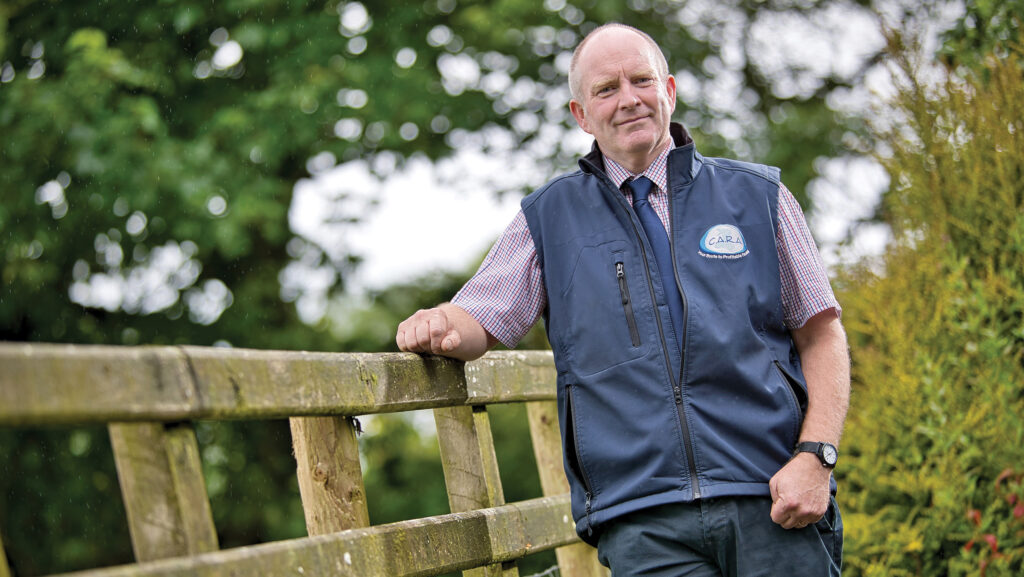IHT and NVZs key issues in Wales for livestock adviser
 Jonathan Crimes © Richard Stanton
Jonathan Crimes © Richard Stanton Jonathan Crimes is busier than ever since winning Farmers Weekly’s 2024 Livestock Adviser of the Year award, with old and new Welsh clients concerned about inheritance tax changes and restricting nitrate levels in their soils.
As senior consultant and founding partner at advisory group Cara Wales, Jonathan looks after about 70 livestock clients across South Wales from his own farm near Lampeter.
See also: How foliar feeding maintained grass growth at half N rate
“Winning the award has certainly been mentioned a lot and the phone has been busy, and we have picked up a few more customers,” he says.
In the 2024 Autumn Budget, the government announced that from April 2026, inherited agricultural assets worth more than £1m, which were previously exempt, would be liable to inheritance tax at 20% (half the usual rate).
However, for many farming couples, this could rise to £3m because of other tax reliefs.
This change has involved Jonathan with more work throughout his predominantly family-farming area.
He has had many initial discussions with farming businesses before other professionals, such as solicitors and accountants, have become involved.
“We are certainly seeing a big impact from the inheritance tax changes, and there are a number of farmers who could go out of business,” he says.
Fact file
- Jonathan has worked as a senior consultant and founding partner for Cara Wales for 20 years
- He has 70 livestock farming clients with whom he deals direct
- There are nine Cara livestock advisers in the group out of a total staff of 14
- The group has some 1,100 livestock farming clients across South Wales
Help with compliance
Another key issue is the Welsh government’s move to declare the whole country a nitrate vulnerable zone (NVZ), which will mean new rules and regulations applying to fertiliser, manure and slurry storage, handling and spreading.
This has meant additional work for Welsh farmers to make sure they comply with the more stringent limits and closed periods for applying nitrogen fertilisers to help protect groundwater from pollution.
“There has been an increased burden on farmers with more paperwork to complete, and we have been asked to do more to help comply with the new regulations,” he says.
This comes at a time when Jonathan has been taking on new clients, with enquiries coming in from as far as North Wales, and he has recently taken on a new beef and sheep client in Mid Wales.
Long-term support
He is still very involved with long-term clients such as Gwyndaf Davies of Trewitial Fawr, Tremain, Cardigan, in Dyfed, where Jonathan’s work has involved guiding the family farm towards beef finishing and away from dairying.
The relationship is 25 years old, formed even before Jonathan helped set up Cara.
It has been instrumental in encouraging Gwyndaf’s son Dion to be enthused about the switch to beef and stay on the farm to help his father, while Dion’s twin brother and his sister are also involved in the farm.
The three-year transition, from 2017 to 2020, saw the farm move to finishing 300 beef cattle on-farm, with many selling at a price premium under a Sainsbury’s Taste the Difference beef scheme.
The greater involvement of the whole family has led them to look at diversifying the farm’s business.
Plans are under way to renovate old farm buildings for tourist accommodation, as the farm is only a few miles from the coast.
The 2025 Farmers Weekly Awards
Livestock Adviser of the Year is one of the 19 categories in the Farmers Weekly Awards.
Table bookings will be opening soon – find out more on the Farmers Weekly Awards website.
